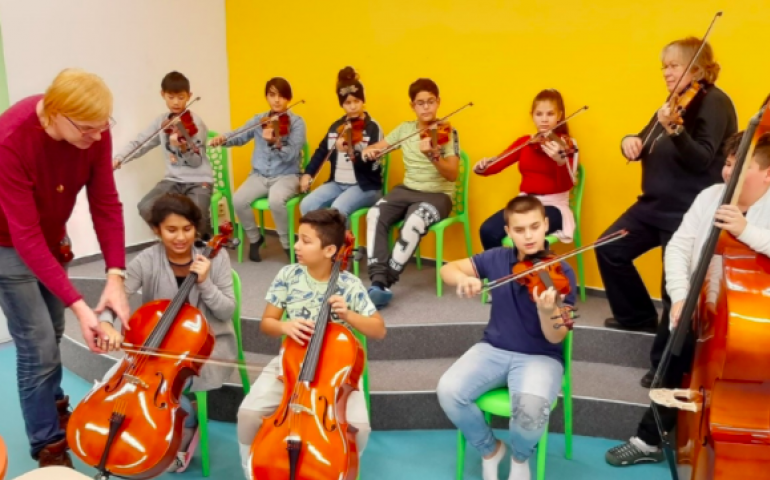Music for social change in Brno
Thanks to the Transfer Network, from 2018 the city of Brno is improving the link between music and cohesion, adopting L’Hospitalet good practice EMMCA (Municipal School of Music and Arts Centre). Based on the idea that cultural and artistic expression is a citizenship right, EMMCA has been providing educational program in deprived areas.
Brno has created extracurricular music classes in primary and secondary schools, along with a choir, in target areas of the city with a high number of socially disadvantaged students or foreigners, with the active collaboration of the city’s municipality and local associations already involved in inclusion projects.
The project has proved that using music as a tool to foster social cohesion is a successful practice.
Brno, the second largest city in the Czech Republic, despite a low poverty rate overall, has identified 16 areas at risk of social exclusion. Mostly located close to the city center and populated by 12-15 000 citizens, these areas are home to mainly Roma people – the major ethnical minority in Brno. Experts estimate that 78% of Roma children leave school early, compared with a regional average of 2.7%. To deal with this situation, Brno municipality welcomed the proposal of the URBACT network ONSTAGE transferring the good practice of L’Hospitalet, namely of the Municipal Music School and Arts Centre (EMMCA) , an education scheme that improves social inclusion through arts and music. Even before ONSTAGE, the municipality co-financed a music programme provided by local organisations and ran high-quality affordable music schools (ZUŠ) for children throughout the city, but children from socially challenged backgrounds were usually unattending.
Through ONSTAGE a wide variety of stakeholders, including representatives from the municipality and the region, all local non-profit organizations and schools situated in the target areas have been brought together to introduce the educational music program similar to EMMCA’s one in 10 target schools.
Brno’s pilot program began in September 2019 in the primary school ZŠ nám. 28. Října, extending the morning curricular programme with an extra music lesson for 5th to 9th grade classes. In parallel, another music program was started in a newly opened kindergarten, MŠ Sýpka, which entailed the setting up of a weekly group music course and the purchase of musical instruments.
At the end of November 2019, a free-of-tuition community choir ONSTAGE was established. In January 2020, another music program in the primary school ZŠ Merhautova (3x2h/week) was opened.
In the spring of 2020, all the programs were well established, but encountered a halt during lockdown. However, despite the slowing of activities due to Covid-19, group violin, cello and guitar lessons began in two primary schools — and in September 2020, 37 students signed up for guitar lessons, four times more than the year before. As a result, the project had a real impact on the understanding and use of music for social change.
One of the key points of the approach has been the establishment of the Urban Local Group (ULG), composed by a wide variety of stakeholders, including both institutional representatives (from the municipality and the region), local associations, and schools. This alliance has been fundamental in supporting the project throughout its duration and assuring the project’s sustainability after its official conclusion. The diversity of the ULG’s members also meant valuable insights into the specific problems of social exclusion and policies to counteract them from different perspectives.
Participation has been one of the main objectives of the project since its early stages and there are now a lot of agents positively engaged.
By targeting schools with a high number of pupils from socially excluded segments of society, participation in the music programs has been fundamental in bringing together children from different backgrounds.
The choir represented an important tool for participation as well. It was the result of a cooperation with local non-profit organization IQ Roma Servis and it was free of tuition. At the basis of the project there was the belief that a broad repertoire – popular songs, gospels and traditional Roma songs – and no age restriction represented promising concepts for creating a community space where local people could meet and share the joy of making music together and get to know the richness of the Roma’s musical culture.
The ON STAGE Transfer Network has made it possible in Brno to think of an innovative and more inclusive music education system through enhancing social cohesion.
Although state basic schools (ZUŠ) offer high quality music education, it is mainly designed to prepare students for the conservatory, which opens for them the opportunity to pursue a professional career in music. Teaching music to enhance social cohesion was a concept little known in the city and its potential had hardly been explored. Being part of the ON STAGE project gave Brno the chance to change this. Social cohesion has been enhanced and many children who did not attend musical classes before have then joined the new programs. For the second year of the programme (2020/2021) even more people signed to the courses and the choir.
Despite Covid-19 related restrictions, all the programs have been successful in establishing foundations with students and teachers who believe in the idea of the project and are willing to continue. In only a short period of time, the ON STAGE project has been meaningful for Brno and can actually make positive changes.
The ON STAGE Trasfernetwork was led by the city of L’Hospitalet and involved, apart from Brno, Aarhus (Denmark), Katowice (Poland), Adelfia (Italy), Valongo (Portugal) and Grigny (France).
The ON STAGE Transfer Network organized also a teachers’ mobility program. For Brno’s teachers, seeing L’Hospitalet’s group-based ‘El Sistema’ teaching method in practice was a real eye-opener — as were opportunities to exchange with partner cities such as Grigny (a suburb of Paris, France).

